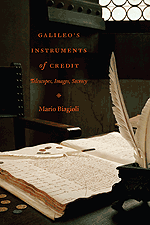Galileo’s telescope

Today’s “Google Doodle” acknowledges the 400th anniversary of the public debut of Galileo Galilei’s telescope, commemorating one of the most important technical innovations in the history of science. As the Guardian‘s Peter Walker writes, it was “exactly 400 years ago today, on 25 August 1609, [that] the Italian astronomer and philosopher Galileo Galilei showed Venetian merchants his new creation, a telescope.”
Though a rather crude instrument by today’s standards, Galileo’s scope allowed him to demonstrate some of the most solid empirical evidence in support of Copernicanism the world had ever seen, producing a revolution, not only in astronomy and cosmology, but in the social fabric of renaissance Italy (and the rest of the western world). With the publication of his observations in Sidereus Nuncius the preeminent scientist immediately found himself at odds with the Vatican and the Medici court, resulting in one of the most famous instances of the intellectual as martyr since Socrates. His struggles to reconcile the troubled relationship between Copernicanism and Scripture, along with his treatment at the hands of the Vatican (put under house arrest for the remainder of his life after being put to trial on suspicion of heresy in 1633), have sparked perennial interest by the writers of the history of science, including Mario Biagioli, professor of history of science at Harvard University, and the author of two books on the subject: Galileo, Courtier: The Practice of Science in the Culture of Absolutism and more recently, Galileo’s Instruments of Credit: Telescopes, Images, Secrecy.

In Galileo, Courtier Biagioli shows how Galileo attempted to gain acceptance of his scientific ideas by fashioning both his career and his science to the demands of Medici court patronage and its complex systems of wealth, power, and prestige; demonstrating how Galileo’s courtly role was integral to his science—the questions he chose to examine, his methods, even his conclusions. And in Galileo’s Instruments of Credit Biagioli expands on his previous work to focus on the aspects of Galileo’s scientific life that extend beyond the framework of court culture, offering a revisionist account of the different systems of exchanges, communication, and credibility at work in various phases of Galileo’s career.
Examining the nexus of science, politics, and power and its inevitable influence on scientific practice, Biagioli’s books offer readers a fascinating and insightful look at Galileo and the lasting impact of his discoveries on the occasion of his invention of one of the most important scientific instruments the world has ever known.
For more read two articles on the topic at the Guardian.co.uk or see this excerpt from Galileo’s Instruments of Credit.